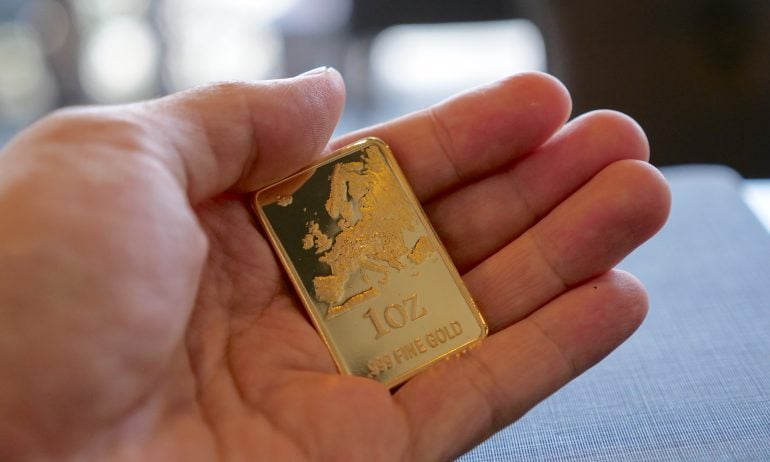How to Buy Gold: 4 Ways to Invest
You have several options to buy gold, including bullion, gold stocks, gold funds and gold futures. Each option has pros and cons.

Many, or all, of the products featured on this page are from our advertising partners who compensate us when you take certain actions on our website or click to take an action on their website. However, this does not influence our evaluations. Our opinions are our own. Here is a list of our partners and here's how we make money.
The investing information provided on this page is for educational purposes only. NerdWallet, Inc. does not offer advisory or brokerage services, nor does it recommend or advise investors to buy or sell particular stocks, securities or other investments.
Gold hit an all-time high in 2026 amid strained international relations and new threats of tariffs on Canadian imports. In January, it broke above $5,000 per ounce for the first time ever.
Is gold a good investment?
Gold has a reputation for being a recession-friendly investment — when the stock market has a big pullback, the price of gold often goes up.
But while the stock market has its ups and downs, investing in physical gold can involve a lot of unexpected costs and considerations, including insurance and secure storage.
Physical gold does not produce cash flow like other assets, and it should be added to your investment mix in a limited quantity and with caution. Many investors will find it easier, safer and more affordable to invest in gold stocks or gold ETFs.
Investors tend to rush into buying gold (and other metals) when they're concerned about other assets or the broader economy, and the on-again, off-again recession fears of the last few years — and uncertainty about the future — have elevated those worries. But while owning gold sounds cool, and can certainly be a hedge during a stock market downturn, figuring out how to buy gold comes with some unique challenges.
You can buy gold in either its physical form (as gold bars, coins, etc.) or as non-physical investments, such as gold stocks or funds. Each of these methods has unique pros and cons. For example, gold stocks, funds, and futures may not hold their value in an extreme crisis, but physical gold can be hard to buy, sell and keep safe.
1. Gold stocks: Best for stockpickers
Gold stocks are shares of publicly-owned companies that have a hand in gold production, such as gold mining companies. When gold prices soar, gold stock prices typically soar alongside them.
Just like buying any individual stock, buying gold stocks comes with some risk, but it means you have complete control over which specific companies you invest in. For example, some investors might opt for a gold-mining company that practices strong environmental responsibility over one that does not. And while owning gold stocks won’t let you hold gold in your hand, it does mean you have the benefit of an asset you can sell at any time.
As with any stock (or most other investments, for that matter) you’ll need a brokerage account in order to invest. Once your account is funded, you’ll be able to pick the gold-related assets you’d like to invest in and place an order for them on your broker’s website.
2. Gold funds: Best for beginner or passive investors
Investing in gold funds, whether those are mutual funds or exchange-traded funds (ETFs), means you own shares in multiple gold-related assets, like many companies that mine or process gold, but you don’t own the actual gold or individual stocks yourself.
Some gold funds, such as the SPDR Gold Trust (GLD), invest directly in gold bullion, while others, such as the Sprott Gold Miners ETF (SGDM), invest in gold mining stocks. Both of these ETFs spent much of 2025 at or near all-time highs.
Gold mutual funds and ETFs have more liquidity than owning physical gold and offer a level of diversification that a single stock does not. ETFs and mutual funds also come with certain legal protections. Be aware that some funds will have management fees.
3. Gold futures: Best for commodity traders
A gold futures contract is an agreement to buy or sell a certain amount of gold at a later date. The contract itself is what is traded on an exchange. Gold futures enjoy more liquidity than physical gold and no management fees, though brokerages may charge a trade fee (also called a commission) per contract.
Keep in mind, trading futures contracts involves a lot of risk and isn’t a suitable investment option for an inexperienced investor. The amount of money you can lose with these investments can exceed your original investment.
What's more, some brokers put special restrictions on futures trading, such as minimum balances or tests for investors. Others don't offer futures at all. For more information, check out our list of the best online brokers for futures trading and commodities.
4. Physical gold: Best for doomsday preppers
Also called “bullion,” this is what most people picture when they think about investing in gold. Gold bars, gold coins, hunks of pure gold and jewelry: It’s the stuff of treasure chests and bank heists.
One of the appeals of gold is that its price is generally not correlated with that of other financial assets, so in theory, it would still have value if a disaster disrupted access to financial markets and banking. But only physical gold could hold its value in such a scenario — gold stocks and gold funds would respond more like traditional stock market investments.
But even though bullion may be the most exciting and apocalypse-proof way to invest in gold, it’s also the most challenging to buy, store and sell.
A note about gold jewelry: While jewelry can sometimes accumulate value over time, appraising it can be complicated, and there are no guarantees you’ll be able to sell a piece for more than you paid for it.
How to buy physical gold in 6 steps
If you decide that investing in physical gold is the right move for you, here are some things to keep in mind.
1. Check out a broker. Some brokers, like Fidelity and Interactive Brokers, allow you to purchase precious metals like gold. These brokers can send the gold to you or hold onto it, eliminating some of the concerns about storage and security.
2. Find a reputable dealer. If you're not interested in buying from a broker, it may be difficult to find a trustworthy seller. From working with pushy salespeople to falling victim to scams, navigating the world of buying and selling gold can be sketchy. Sellers can inflate their product’s value, or use persuasion tactics to create a sense of urgency to buy immediately. Doing some homework ahead of time can help you avoid a bad investment.
You can use the National Futures Association’s Background Affiliation Status Information Center to vet a firm or individual that buys or sells physical gold.
3. Watch out for fees. Gold dealers typically charge more than gold’s “spot price,” or the price at which gold trades on a commodities exchange. This premium typically consists of a dealer’s fee and manufacturing and distribution charges.
4. Find secure storage. People joke about burying gold for a reason: It’s valuable, and because it's a physical commodity, people may try to steal it. It’s important to anticipate storing your gold somewhere safe, whether that is a literal safe or a safety deposit box at a bank. Storing gold safely can get expensive. Depending on their size, safety deposit boxes at a bank can run from $30 to a couple hundred dollars a year.
5. Consider purchasing insurance. Insurance is an additional cost of owning physical gold. If you purchase insurance, be sure your policy covers the exact type of asset you have.
6. Know your investment is illiquid. Unlike gold stocks and funds, it may be tough to resell physical gold. Pawn shops aren’t known for their fair pricing, and if you sell your gold back to a dealer, you’ll likely sell for below gold’s spot price.
» Learn how to sell gold
The pitfalls of collecting physical gold: A personal experience
Arielle O'Shea, head of NerdWallet's investing and taxes team, found out firsthand how complicated and unreliable physical gold can be as an investment, when she tried to sell some hand-me-down gold jewelry that didn't match her style.
First, she had to research the reputability of her local gold shop — not all purchasers have a reputation for offering fair prices to sellers. "Before I went, I posted on the Charlottesville Reddit, and asked if I was correct that [the local gold shop] was the best place to go. I got a lot of comments from people that recommended it, and said that they seemed really legit, and had prices displayed," O'Shea says.
But then, when she went to the shop, she got an unpleasant surprise about the composition of her "gold" jewelry collection. The purchasers revealed to her, through magnetic and chemical testing, that little of the jewelry was actual gold.
"At some point, it must've gotten mixed in with costume jewelry," O'Shea says. "A lot of the process was me taking things back, and putting them back in my bag," she says.
Much of O'Shea's "gold" hand-me-down jewelry was imitation gold and had little resale value. She also brought in some collectible coins, which turned out to be real gold, but they still fetched a reduced price due to wear and tear such as scratches.
O'Shea's story goes to show that although physical gold might seem like a valuable heirloom to leave to your descendants, it's actually somewhat questionable as a real-world store of value. Physical gold has to be physically taken care of. Over the course of multiple generations, it's possible someone could damage it, or mix inauthentic, less-valuable items into the collection.
Brokerage firms | |
|---|---|
Why are gold prices high right now?
Gold prices tend to rise during periods of economic uncertainty, due to the metal's reputation as a store of value that does not move in sync with stock and bond prices. In 2026, gold has reached new highs due in large part to worries about volatile foreign policy and the potential effects that could have on the U.S. dollar.
Many of President Donald Trump's recent actions (such as threatening to implement 100% tariffs on Canadian imports and attempting to acquire Greenland) have driven up the price of gold as investors seek out safe-haven investments. Many investors believe that gold can retain its value in the event of a sharp drop in the value of the dollar.
Does gold diversify your portfolio?
Yes — one benefit of gold investments is that they can help diversify your portfolio. Diversification refers to investing in a range of assets across a variety of industries, company sizes and geographic areas. Owning stock in a gold mining company or a gold ETF exposes you to the gold industry, and since gold does not necessarily move in tandem with the stock market, it can help further diversify your holdings. Of course, if your entire portfolio is made up of gold investments, it won’t be diversified at all.









